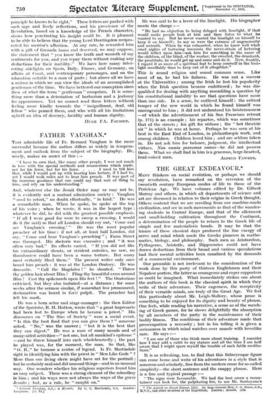FATHER VAUGHAN.*
Tins admirable life of Fr. Bernard Vaughan is the more successful because the author differs so widely in tempera- ment and outlook from the subject of the biography. He, wisely, makes no secret of this :— " I have to own that, like many other people, I was not much in love with the special methods and mannerisms which made, not for his force, but for his fame. . . . I used to tell him that, while I would put up with hearing him lecture, if I had to, yet I would walk miles not to hear him preach. It was part of his immense goodness that one could say that sort of thing to him, and rely on his understanding."
And, whatever else the Jesuit Order may or may not be, it is evidently not a mutual admiration society : Vaughan "used to retort," no doubt effectually, "in kind." He was a remarkable man. When he spoke, he spoke at the top of his voice ; when he wrote, it was in the largest type ; whatever he did, he did with the greatest possible emphasis.
If all I were good for were to sweep a crossing, I would do it (he said) so that all London should cry out, 'Come and see Vaughan's crossing.'" He was the most popular preacher of his time : if not all, at least half London, did say, "Come and hear Vaughan's preaching " ; Farm Street'
was thronged. His rhetoric was excessive ; and "it was often very bad." Its effects varied. "If you did not like
his extraordinary shouts, or strident outcries, no saw, no thumbscrew could have been a worse torture. But many most certainly liked them." The present writer only once heard him preach : it was at the London Oratory. He was dramatic. "Call the Magdalen ! " he shouted. "Throw thy golden hair about him! Fling thy beautiful arms around Him ! Cast thy spikenards upon His feet ! " The Oratorians criticized, but they also imitated—at a distance ; for some weeks after the sermon similar, if somewhat less pronounced, declamation was heard in their pulpit. The preacher had left his mark.
He was a born actor and stage-manager : the then Editor of the Spectator, R. II. Hutton, wrote that "a great impresario
had been lost to Europe when he became a priest." His discourses on "The Sins of Society" were a social event. "Is this the best food that you can give them ? " someone asked. "No," was the answer ; "but it is the best that they can digest." He was a man of many moods and of many-sided activities—" not one, but all mankind's epitome" —and he threw himself into each wholeheartedly ; the part he played was, for the moment, the man. So that, like "0. B.," he became a centre of legend. Is Fr. Martindale right in identifying him with the priest in "Men Like Gods " ? More than one living cleric might have sat for the portrait ; but he certainly said and did unusual things—and in an unusual way. One wonders whether his religious superiors found him an easy subject. There was a strong element of the schoolboy in him ; and his ways were not always the ways of the grave Jesuits ; but, as a rule, he "caught on."
• Bernard Vaughan, 8,J±: a Memoir, By C. V. Martindale, S.J, London : L011gTIIIMS. [7s. 6d.] He was said to be a lover of the limelight. His biographer meets the charge :— "He had no objection to being deluged with limelight, if that would make people look at him and then listen to what he wanted to say. But he never wanted the limelight on himself to keep it on himself ; to say so were the extreme of ungenerosity and untruth. When he was exhausted, when he knew well what cruel nights of torturing insomnia the nerve-strain of lecturing would inflict upon him—ask him for something in the name of the children, of the blind, of the worker, the sweated, the drunkard, the prostitute, he would get up and come and do it. Now, frankly, I regard it as more of a spiritual feat to keep yourself in the lime- light unselfishly than to keep out of it altogether."
This is sound religion and sound common sense. Like most of us, he had his failures. He was not a success at the Universities ; among the Irish he lost his popularity when the Irish question became embittered ; he was dis- qualified for dealing with anything resembling a question by his constitutional inability to see that questions have more than one side. In a sense, he outlived himself : the critical temper of the new world in which he found himself was uncongenial to him ; it did not understand his boisterousness —of which the advertisement of his San Francisco retreat (p. 171) is an example ; his repartee, which was sometimes that of the streets ; his gift for reclame ; the "hot theatrio air" in which he was at home. Perhaps he was seen at his best in the East End of London, in philanthropic work, and among children. Children loved him ; and are seldom taken in. Do not ask him for balance, judgment, the intellectual virtues. Nan omnia possumus omnes—he did not possess them. What we shall find in him is a generous, large-hearted,


























































 Previous page
Previous page